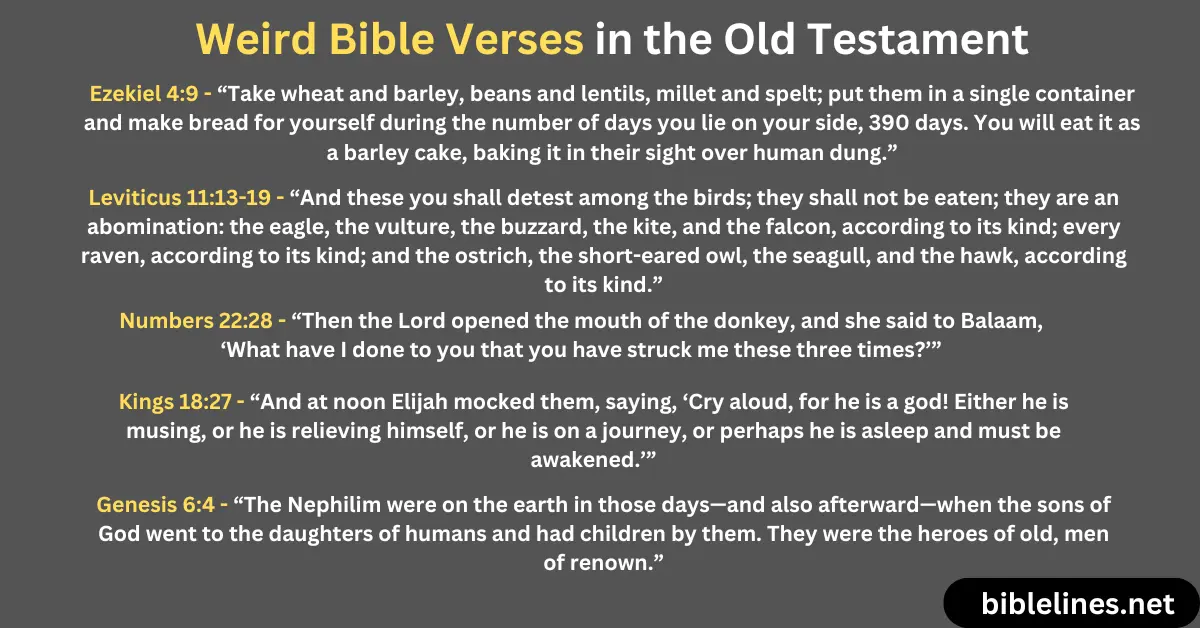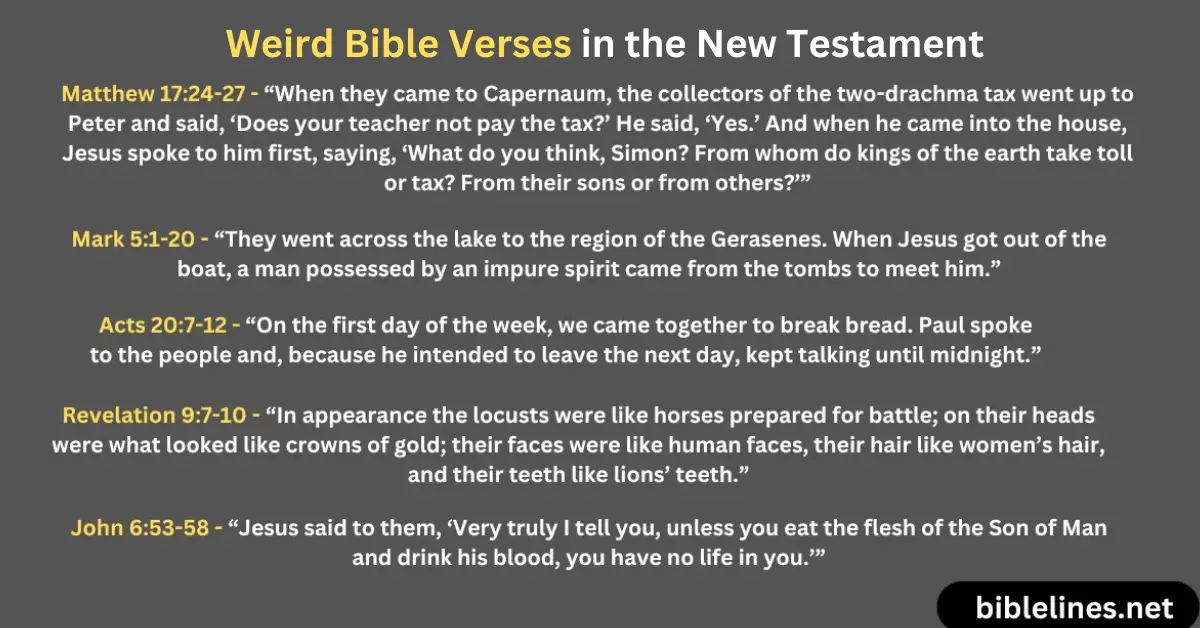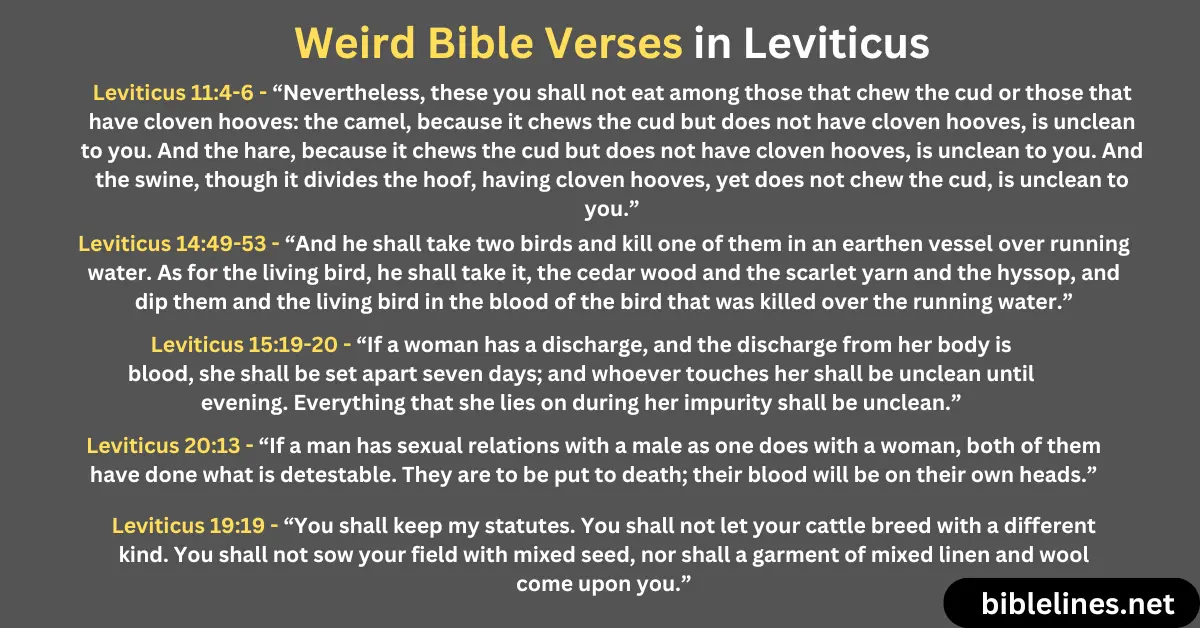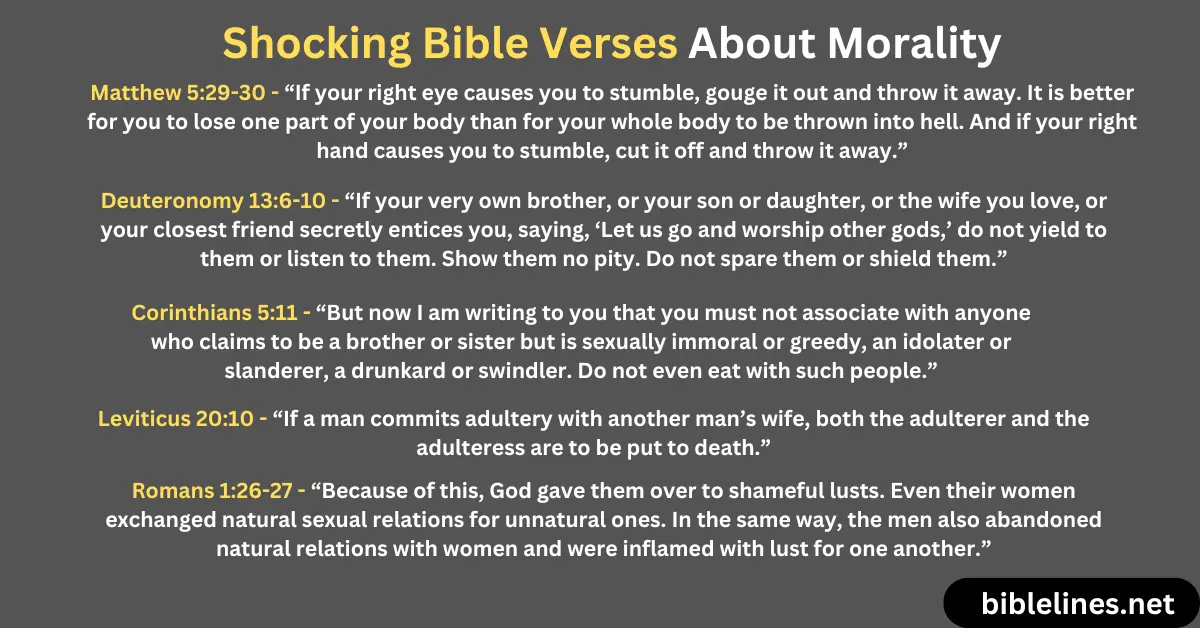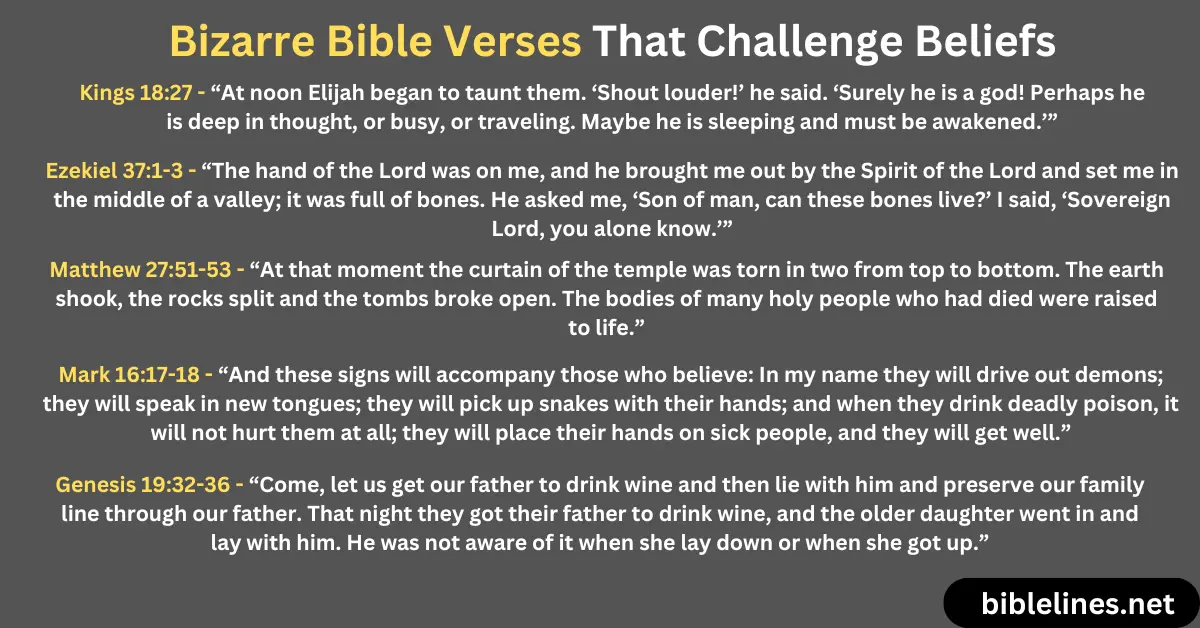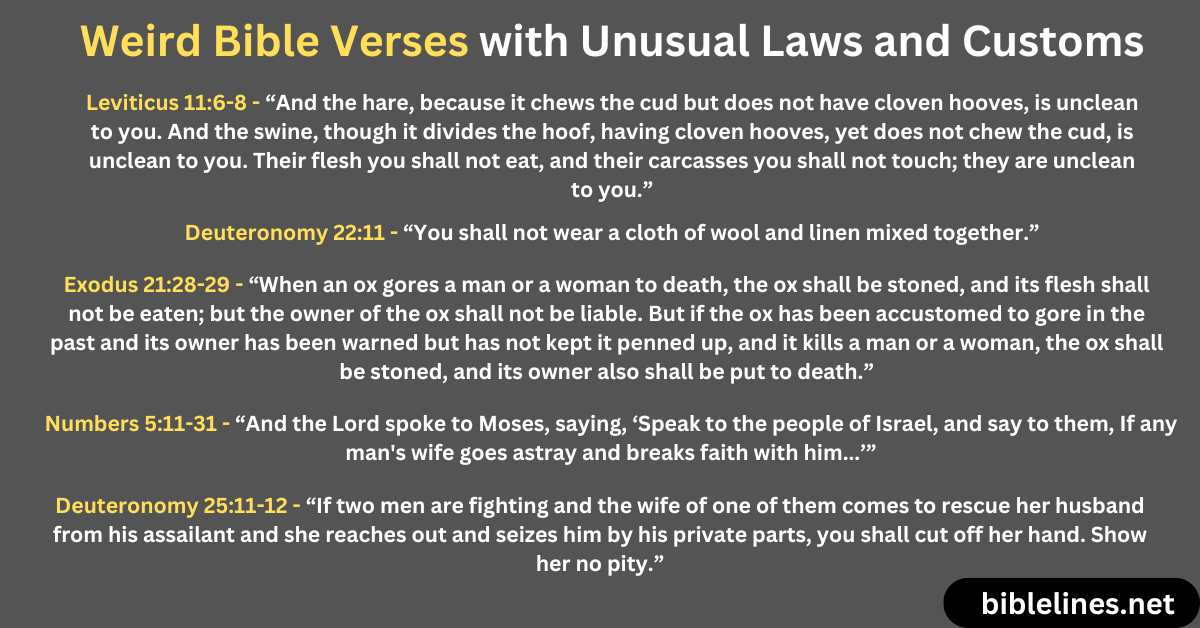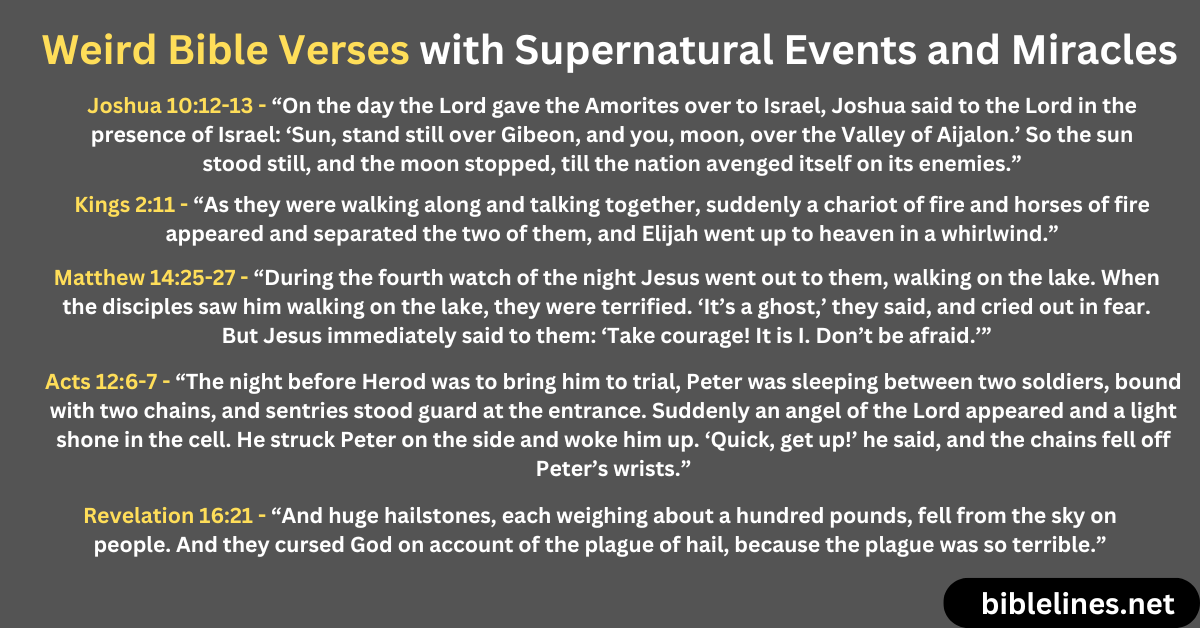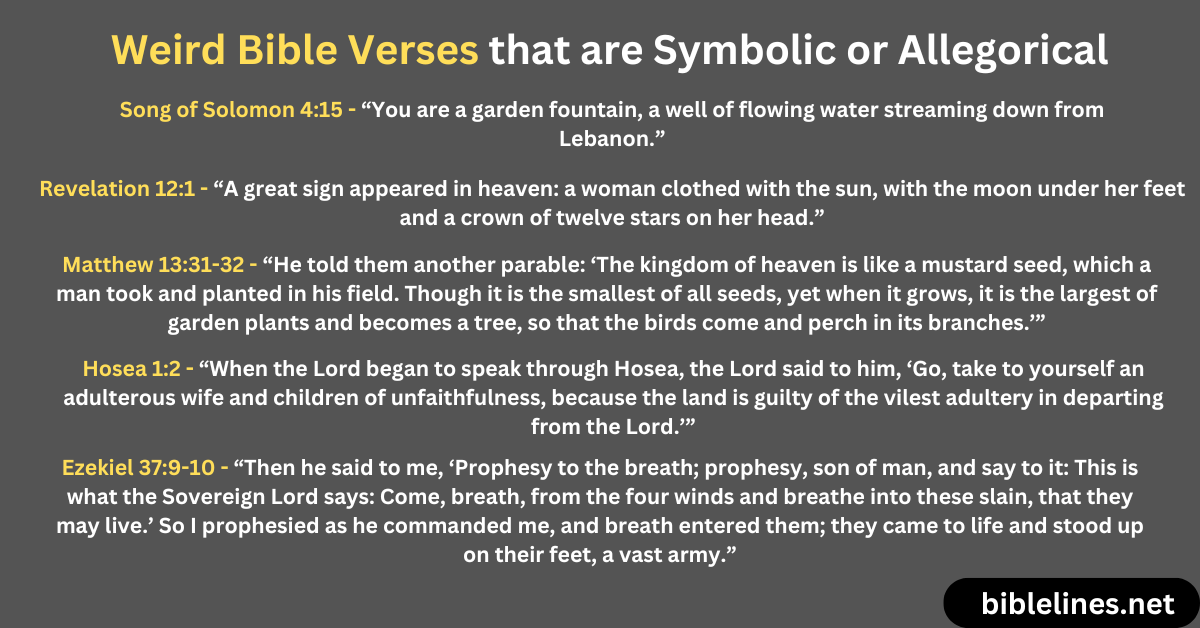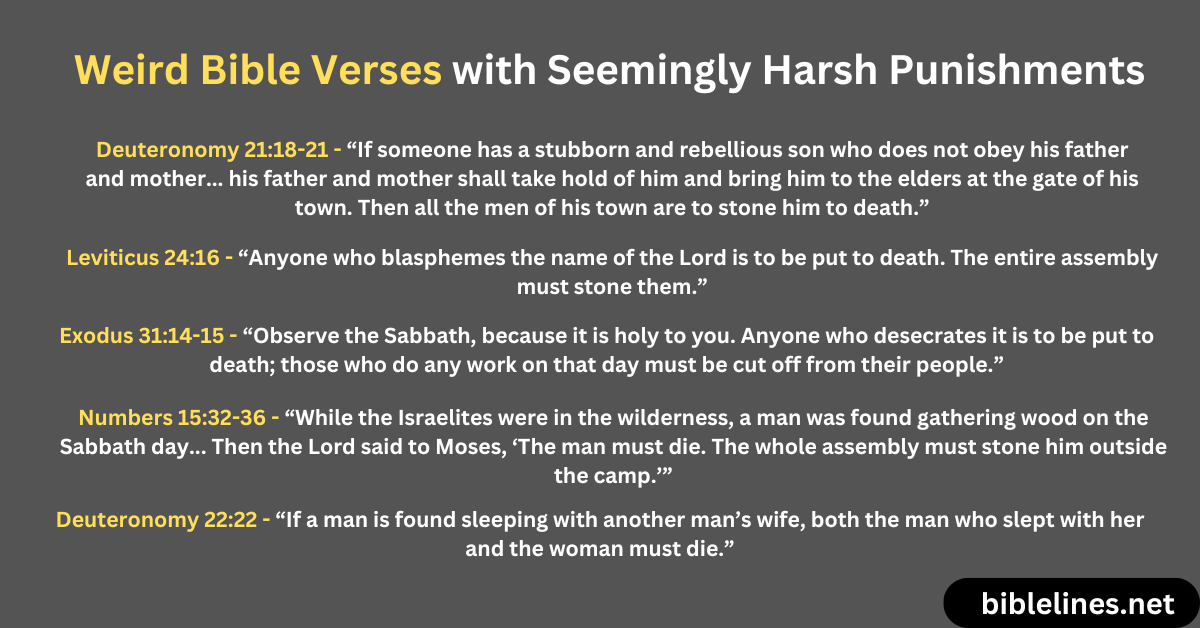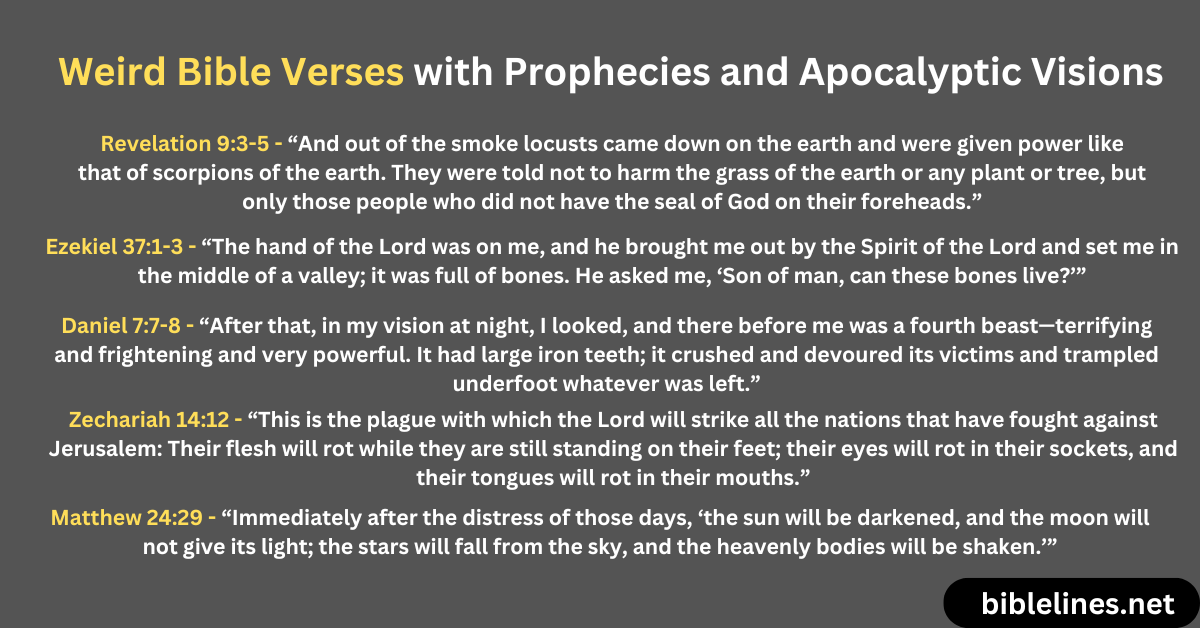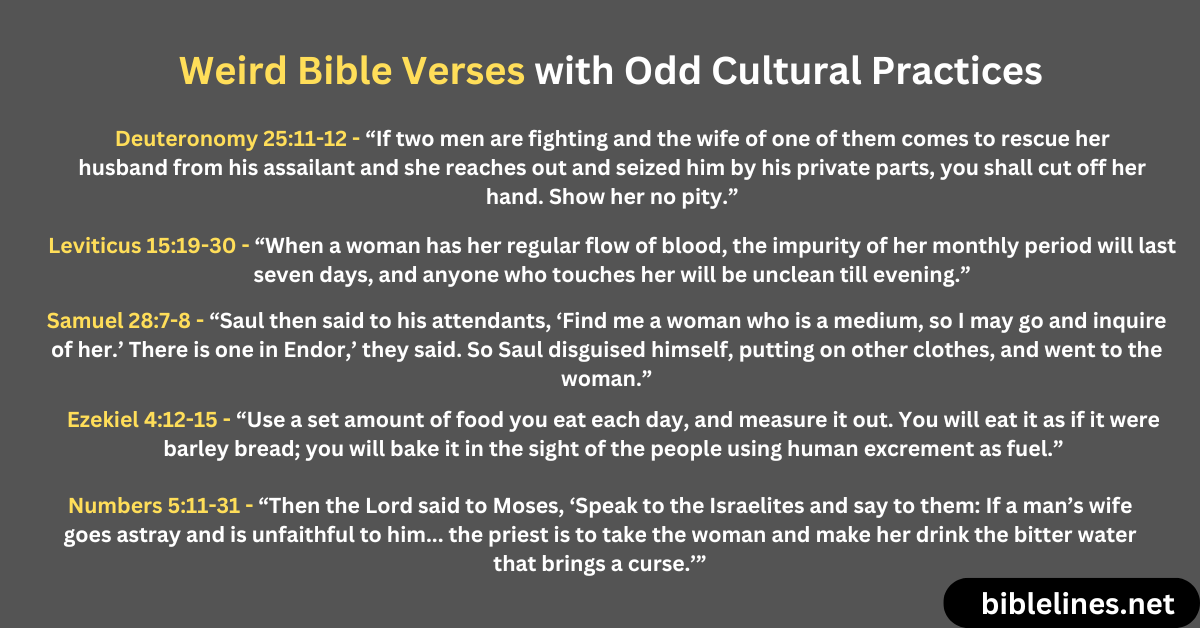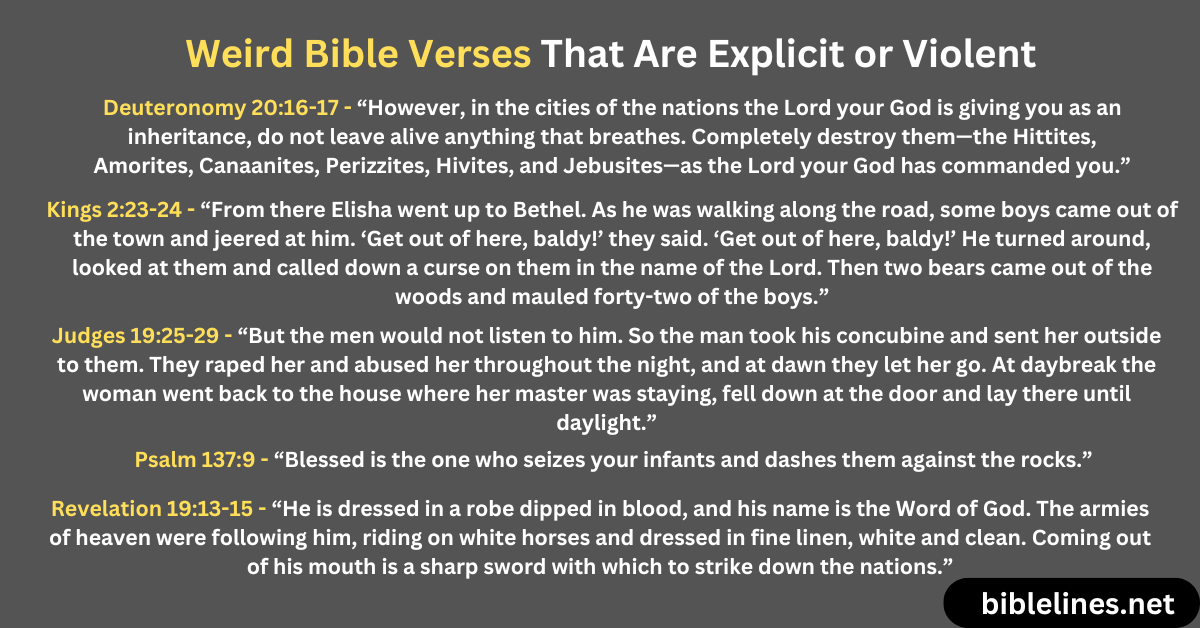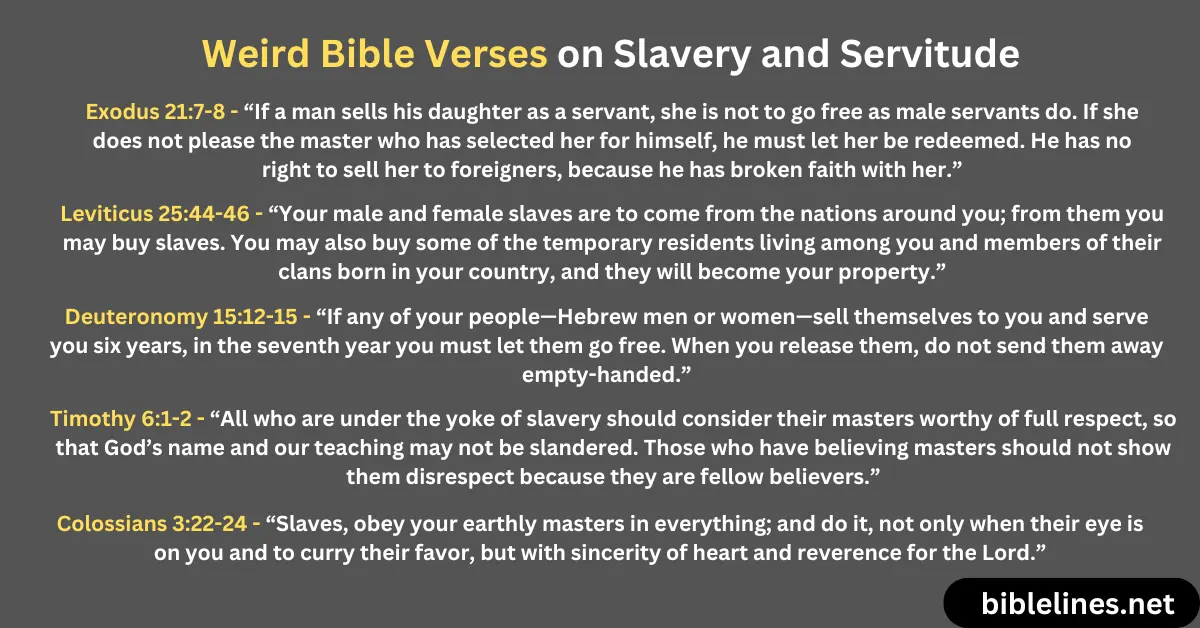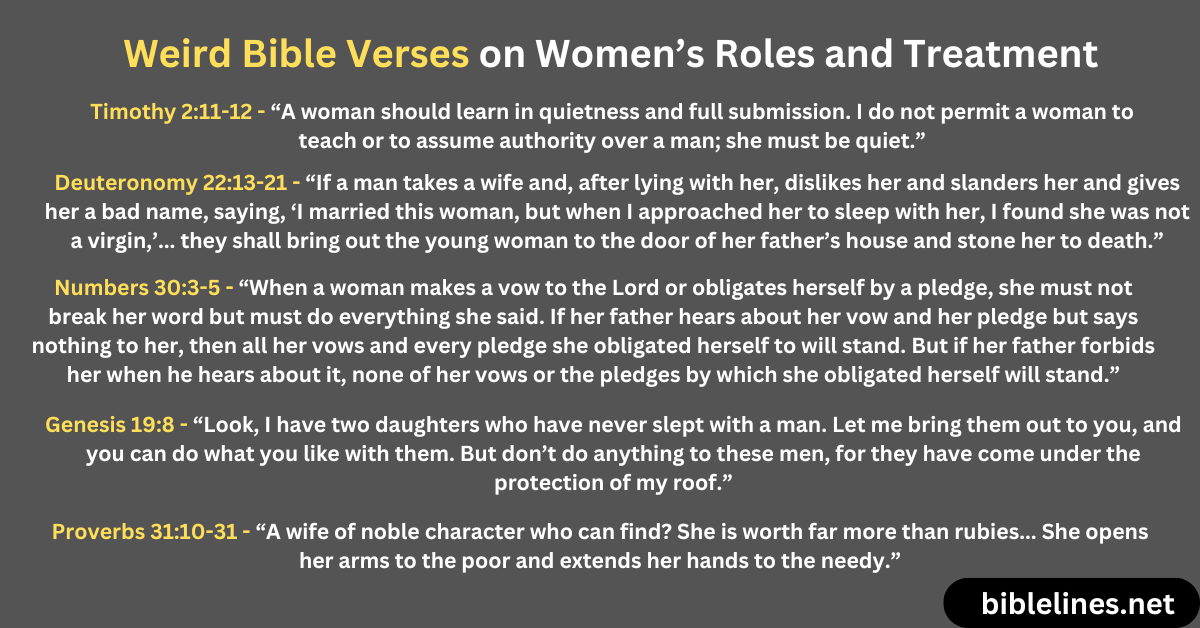Many people are unaware of the weird and strange verses found in the Bible. At first glance, these verses may seem puzzling or even bizarre, leaving us to wonder about their meaning and significance. However, if we take a moment to dive deeper, we can uncover insights that challenge our modern sensibilities.
These texts are not just random oddities; they carry profound lessons about love, redemption, and faith that resonate with millions.
In the following sections, we will explore 70+ of the most unconventional Bible verses, categorized by their themes and origins. From laws in the Old Testament that seem out of place today to mystical encounters and cryptic prophecies, these passages invite us to consider God’s ways in a new light.
With each verse, we have the chance to deepen our understanding of the divine truth nestled within the sacred pages of the Bible. Get ready to feel awe and wonder as we unravel these thought-provoking scriptures together.
The Bible is a complex collection of texts that many consider a source of comfort and truth. However, some verses can be quite crazy and leave us wondering about their meaning. These head-scratching passages may seem bizarre at first glance, but there is often more beneath the surface.
As we explore these verses, we can uncover insights that challenge our understanding and invite us to ask deeper questions about God’s Word.
In this article, we will examine various sections of the Bible that contain unusual and profound messages. From strange laws to grand narratives that raise more questions than answers, we will dive into the content that makes us rethink our perceptions of faith and spirituality.
Each page of the Bible holds the potential to reveal wonderful truths and lessons that can guide us in our daily lives, even if they seem out of place at times.
Some scriptures may seem strange at first glance, but they often hold deeper meanings. Similarly, Scriptures About Achieving Success and Haunting Bible Verses reveal profound lessons when explored thoughtfully.
70+ Weird Bible Verses That Will Leave You Speechless
Weird Bible verses may seem bizarre, but they offer profound lessons on faith, love, and redemption when explored beyond their surface meaning.
List of 70+ Most Ever Weird Bible Verses
Weird Bible Verses in the Old Testament
Ezekiel 4:9 – “Take wheat and barley, beans and lentils, millet and spelt; put them in a single container and make bread for yourself during the number of days you lie on your side, 390 days. You will eat it as a barley cake, baking it in their sight over human dung.”
Explanation: God commands Ezekiel to cook bread over human dung to symbolize the defilement of the Israelites during their captivity. This unusual instruction serves as a powerful metaphor for the consequences of their sin and a call to repentance.
Leviticus 11:13-19 – “And these you shall detest among the birds; they shall not be eaten; they are an abomination: the eagle, the vulture, the buzzard, the kite, and the falcon, according to its kind; every raven, according to its kind; and the ostrich, the short-eared owl, the seagull, and the hawk, according to its kind.”
Explanation: This passage outlines specific birds that are considered unclean for the Israelites to eat. The peculiar dietary laws served to set the Israelites apart from other nations and reinforce their identity as God’s chosen people.
Numbers 22:28 – “Then the Lord opened the mouth of the donkey, and she said to Balaam, ‘What have I done to you that you have struck me these three times?’”
Explanation: In this story, Balaam’s donkey miraculously speaks after being beaten. This strange event highlights God’s power to communicate through unexpected means and serves as a reminder of the importance of listening to divine guidance.
Kings 18:27 – “And at noon Elijah mocked them, saying, ‘Cry aloud, for he is a god! Either he is musing, or he is relieving himself, or he is on a journey, or perhaps he is asleep and must be awakened.’”
Explanation: Elijah mocks the prophets of Baal during a contest to demonstrate whose God is real. His humorous taunts, especially suggesting Baal might be “relieving himself,” emphasize the absurdity of idol worship and highlight the power of the one true God.
Genesis 6:4 – “The Nephilim were on the earth in those days—and also afterward—when the sons of God went to the daughters of humans and had children by them. They were the heroes of old, men of renown.”
Explanation: This verse references the Nephilim, mysterious beings said to be the offspring of divine beings and humans. The strangeness of their existence raises many questions about their nature and serves as a precursor to the flood narrative, illustrating the corruption of humanity.
Weird Bible Verses in the New Testament
Matthew 17:24-27 – “When they came to Capernaum, the collectors of the two-drachma tax went up to Peter and said, ‘Does your teacher not pay the tax?’ He said, ‘Yes.’ And when he came into the house, Jesus spoke to him first, saying, ‘What do you think, Simon? From whom do kings of the earth take toll or tax? From their sons or from others?’”
Explanation: Jesus instructs Peter to find a coin in the mouth of a fish to pay the temple tax. This unusual method highlights Jesus’ divine provision and emphasizes that His followers are free from earthly obligations.
Mark 5:1-20 – “They went across the lake to the region of the Gerasenes. When Jesus got out of the boat, a man possessed by an impure spirit came from the tombs to meet him.”
Explanation: This verse describes Jesus encountering a man possessed by demons, showcasing His authority over evil. The bizarre nature of the possession and the subsequent miracle of healing illustrate the reality of spiritual warfare.
Acts 20:7-12 – “On the first day of the week, we came together to break bread. Paul spoke to the people and, because he intended to leave the next day, kept talking until midnight.”
Explanation: During a lengthy sermon, a young man named Eutychus falls asleep and falls from a window, only to be miraculously raised back to life by Paul. This incident emphasizes the power of God’s presence during worship and the importance of attentiveness.
Revelation 9:7-10 – “In appearance the locusts were like horses prepared for battle; on their heads were what looked like crowns of gold; their faces were like human faces, their hair like women’s hair, and their teeth like lions’ teeth.”
Explanation: This vivid imagery in Revelation describes locusts as strange, hybrid creatures representing judgment during the end times. The bizarre nature of the description underscores the chaos and destruction associated with apocalyptic events.
John 6:53-58 – “Jesus said to them, ‘Very truly I tell you, unless you eat the flesh of the Son of Man and drink his blood, you have no life in you.’”
Explanation: Jesus uses shocking language to convey the necessity of spiritual communion with Him for eternal life. This metaphor emphasizes the sacrificial nature of His death and the establishment of the Eucharist, which can sound strange to modern readers.
Weird Bible Verses in Leviticus
Leviticus 11:4-6 – “Nevertheless, these you shall not eat among those that chew the cud or those that have cloven hooves: the camel, because it chews the cud but does not have cloven hooves, is unclean to you. And the hare, because it chews the cud but does not have cloven hooves, is unclean to you. And the swine, though it divides the hoof, having cloven hooves, yet does not chew the cud, is unclean to you.”
Explanation: This passage outlines dietary laws regarding clean and unclean animals. The classification seems strange to modern readers, but it served to distinguish the Israelites from other nations and to reinforce their identity and holiness.
Leviticus 14:49-53 – “And he shall take two birds and kill one of them in an earthen vessel over running water. As for the living bird, he shall take it, the cedar wood and the scarlet yarn and the hyssop, and dip them and the living bird in the blood of the bird that was killed over the running water.”
Explanation: This verse describes the ritual for cleansing a person with leprosy, involving the sacrifice of birds and the use of specific materials. The bizarre nature of the ritual emphasizes the seriousness of sin and the need for purification in the community.
Leviticus 15:19-20 – “If a woman has a discharge, and the discharge from her body is blood, she shall be set apart seven days; and whoever touches her shall be unclean until evening. Everything that she lies on during her impurity shall be unclean.”
Explanation: This passage addresses the laws concerning a woman’s menstrual cycle, which may seem strange or overly detailed today. These laws reflect the cultural views of purity and cleanliness and aimed to maintain the holiness of the community.
Leviticus 20:13 – “If a man has sexual relations with a male as one does with a woman, both of them have done what is detestable. They are to be put to death; their blood will be on their own heads.”
Explanation: This verse presents a harsh punishment for same-sex relations, which can appear shocking. It reflects the cultural context of ancient Israel and the emphasis on maintaining moral purity within the community according to their understanding of God’s laws.
Leviticus 19:19 – “You shall keep my statutes. You shall not let your cattle breed with a different kind. You shall not sow your field with mixed seed, nor shall a garment of mixed linen and wool come upon you.”
Explanation: This passage prohibits crossbreeding animals, mixing seeds, and wearing mixed fabrics. The strange nature of these laws highlights the importance of maintaining purity and separation in the community, symbolizing their distinct relationship with God.
Shocking Bible Verses About Morality
Matthew 5:29-30 – “If your right eye causes you to stumble, gouge it out and throw it away. It is better for you to lose one part of your body than for your whole body to be thrown into hell. And if your right hand causes you to stumble, cut it off and throw it away.”
Explanation: In this intense metaphor, Jesus emphasizes the seriousness of sin and the lengths one should go to avoid it. The shocking imagery highlights the importance of moral integrity and the drastic measures one might need to take to maintain a righteous life.
Deuteronomy 13:6-10 – “If your very own brother, or your son or daughter, or the wife you love, or your closest friend secretly entices you, saying, ‘Let us go and worship other gods,’ do not yield to them or listen to them. Show them no pity. Do not spare them or shield them.”
Explanation: This verse addresses the extreme measures to be taken against family members encouraging idolatry. The harshness of this directive underscores the seriousness of maintaining loyalty to God and the community, even at the cost of personal relationships.
Corinthians 5:11 – “But now I am writing to you that you must not associate with anyone who claims to be a brother or sister but is sexually immoral or greedy, an idolater or slanderer, a drunkard or swindler. Do not even eat with such people.”
Explanation: Paul instructs the Corinthians to avoid associating with those who live unrepentantly in sin. This shocking directive emphasizes the importance of moral accountability within the community and the need to uphold the standards of Christian conduct.
Leviticus 20:10 – “If a man commits adultery with another man’s wife, both the adulterer and the adulteress are to be put to death.”
Explanation: This strict punishment for adultery reflects the seriousness of marital fidelity in ancient Israel. The severity of this law highlights the importance of maintaining moral boundaries and the consequences of violating them.
Romans 1:26-27 – “Because of this, God gave them over to shameful lusts. Even their women exchanged natural sexual relations for unnatural ones. In the same way, the men also abandoned natural relations with women and were inflamed with lust for one another.”
Explanation: This passage speaks to the consequences of turning away from God, describing a moral decline that results in shameful behavior. The shocking nature of these verses emphasizes the biblical view of sexuality and the moral implications of rejecting divine standards.
Bizarre Bible Verses That Challenge Beliefs
Kings 18:27 – “At noon Elijah began to taunt them. ‘Shout louder!’ he said. ‘Surely he is a god! Perhaps he is deep in thought, or busy, or traveling. Maybe he is sleeping and must be awakened.’”
Explanation: Elijah’s mocking of the prophets of Baal during a contest to prove whose God is real presents a bizarre challenge to the legitimacy of idol worship. This unexpected humor highlights the absurdity of relying on false gods and invites readers to reflect on their own beliefs.
Ezekiel 37:1-3 – “The hand of the Lord was on me, and he brought me out by the Spirit of the Lord and set me in the middle of a valley; it was full of bones. He asked me, ‘Son of man, can these bones live?’ I said, ‘Sovereign Lord, you alone know.’”
Explanation: The vision of dry bones coming to life challenges conventional beliefs about death and resurrection. This bizarre imagery serves as a metaphor for spiritual renewal and God’s power to restore life, prompting readers to reconsider their understanding of hope and revival.
Matthew 27:51-53 – “At that moment the curtain of the temple was torn in two from top to bottom. The earth shook, the rocks split and the tombs broke open. The bodies of many holy people who had died were raised to life.”
Explanation: The miraculous events surrounding Jesus’ crucifixion, including the resurrection of dead saints, are shocking and challenge beliefs about life after death. This bizarre occurrence underscores the significance of Jesus’ sacrifice and the promise of resurrection for believers.
Mark 16:17-18 – “And these signs will accompany those who believe: In my name they will drive out demons; they will speak in new tongues; they will pick up snakes with their hands; and when they drink deadly poison, it will not hurt them at all; they will place their hands on sick people, and they will get well.”
Explanation: This passage describes extraordinary signs and wonders that believers can perform, which can be challenging to accept. The bizarre nature of these claims encourages a deeper exploration of faith and the supernatural, prompting believers to consider the extent of God’s power.
Genesis 19:32-36 – “Come, let us get our father to drink wine and then lie with him and preserve our family line through our father. That night they got their father to drink wine, and the older daughter went in and lay with him. He was not aware of it when she lay down or when she got up.”
Explanation: The story of Lot’s daughters getting him drunk to conceive children is shocking and raises uncomfortable questions about morality and human behavior. This bizarre narrative challenges readers to think about the complexities of sin and the consequences of desperation.
Weird Bible Verses with Unusual Laws and Customs
Leviticus 11:6-8 – “And the hare, because it chews the cud but does not have cloven hooves, is unclean to you. And the swine, though it divides the hoof, having cloven hooves, yet does not chew the cud, is unclean to you. Their flesh you shall not eat, and their carcasses you shall not touch; they are unclean to you.”
Explanation: This passage outlines dietary restrictions that may seem strange today, particularly the prohibition against certain animals. These laws were intended to set the Israelites apart from other nations and emphasize their unique covenant with God.
Deuteronomy 22:11 – “You shall not wear a cloth of wool and linen mixed together.”
Explanation: This unusual law forbids wearing garments made from mixed fabrics, which can seem arbitrary. It symbolizes the importance of purity and separation in the lives of the Israelites, reflecting their commitment to God’s commandments.
Exodus 21:28-29 – “When an ox gores a man or a woman to death, the ox shall be stoned, and its flesh shall not be eaten; but the owner of the ox shall not be liable. But if the ox has been accustomed to gore in the past and its owner has been warned but has not kept it penned up, and it kills a man or a woman, the ox shall be stoned, and its owner also shall be put to death.”
Explanation: This law regarding the consequences of an ox goring a person may seem bizarre. It illustrates the ancient legal system’s emphasis on responsibility and accountability, as well as the value placed on human life.
Numbers 5:11-31 – “And the Lord spoke to Moses, saying, ‘Speak to the people of Israel, and say to them, If any man’s wife goes astray and breaks faith with him…’”
Explanation: This passage details the ritual for dealing with a suspected unfaithful wife, which includes drinking bitter water. The custom raises eyebrows due to its mysterious and archaic nature, reflecting cultural attitudes toward marriage and fidelity in ancient Israel.
Deuteronomy 25:11-12 – “If two men are fighting and the wife of one of them comes to rescue her husband from his assailant and she reaches out and seizes him by his private parts, you shall cut off her hand. Show her no pity.”
Explanation: This shocking law addresses a bizarre situation in which a woman intervenes in a fight. The harsh punishment reflects the seriousness of protecting male honor and the extreme measures taken in ancient cultures regarding sexual conduct.
Weird Bible Verses with Supernatural Events and Miracles
Joshua 10:12-13 – “On the day the Lord gave the Amorites over to Israel, Joshua said to the Lord in the presence of Israel: ‘Sun, stand still over Gibeon, and you, moon, over the Valley of Aijalon.’ So the sun stood still, and the moon stopped, till the nation avenged itself on its enemies.”
Explanation: In this incredible account, Joshua commands the sun and moon to halt, leading to an extended day for battle. This bizarre miracle emphasizes God’s power to intervene in nature and support His people in their struggles.
Kings 2:11 – “As they were walking along and talking together, suddenly a chariot of fire and horses of fire appeared and separated the two of them, and Elijah went up to heaven in a whirlwind.”
Explanation: The dramatic ascension of Elijah into heaven in a chariot of fire is a stunning supernatural event that challenges natural laws. This bizarre occurrence signifies Elijah’s prophetic authority and foreshadows the hope of divine intervention.
Matthew 14:25-27 – “During the fourth watch of the night Jesus went out to them, walking on the lake. When the disciples saw him walking on the lake, they were terrified. ‘It’s a ghost,’ they said, and cried out in fear. But Jesus immediately said to them: ‘Take courage! It is I. Don’t be afraid.’”
Explanation: Jesus walking on water is one of the most famous miracles in the New Testament. This bizarre event challenges the laws of physics and illustrates Jesus’ divine nature and His power over creation, reinforcing the call to faith in Him.
Acts 12:6-7 – “The night before Herod was to bring him to trial, Peter was sleeping between two soldiers, bound with two chains, and sentries stood guard at the entrance. Suddenly an angel of the Lord appeared and a light shone in the cell. He struck Peter on the side and woke him up. ‘Quick, get up!’ he said, and the chains fell off Peter’s wrists.”
Explanation: Peter’s miraculous escape from prison, aided by an angel, is a surreal event that showcases God’s intervention in dire circumstances. This bizarre moment emphasizes the power of prayer and the supernatural protection afforded to believers.
Revelation 16:21 – “And huge hailstones, each weighing about a hundred pounds, fell from the sky on people. And they cursed God on account of the plague of hail, because the plague was so terrible.”
Explanation: The imagery of massive hailstones falling from the sky during the end times is both bizarre and terrifying. This supernatural event serves as a warning of divine judgment and the consequences of human rebellion against God.
Weird Bible Verses that are Symbolic or Allegorical
Song of Solomon 4:15 – “You are a garden fountain, a well of flowing water streaming down from Lebanon.”
Explanation: This poetic verse uses vivid imagery to symbolize love and beauty. The garden and flowing water represent intimacy and vitality in relationships, showcasing the allegorical nature of the text, which speaks to both romantic love and the love between God and His people.
Revelation 12:1 – “A great sign appeared in heaven: a woman clothed with the sun, with the moon under her feet and a crown of twelve stars on her head.”
Explanation: The vision of the woman in Revelation is rich with symbolism, representing Israel or the church and its role in salvation history. The celestial imagery conveys deeper spiritual truths about God’s plan and the cosmic struggle between good and evil.
Matthew 13:31-32 – “He told them another parable: ‘The kingdom of heaven is like a mustard seed, which a man took and planted in his field. Though it is the smallest of all seeds, yet when it grows, it is the largest of garden plants and becomes a tree, so that the birds come and perch in its branches.’”
Explanation: This parable uses the mustard seed to symbolize the growth of God’s kingdom from small beginnings to something significant. The imagery invites readers to reflect on faith’s potential and the transformative power of God’s work in the world.
Hosea 1:2 – “When the Lord began to speak through Hosea, the Lord said to him, ‘Go, take to yourself an adulterous wife and children of unfaithfulness, because the land is guilty of the vilest adultery in departing from the Lord.’”
Explanation: Hosea’s marriage to an unfaithful woman serves as a symbolic representation of Israel’s infidelity to God. This unusual directive illustrates the deep emotional struggle in God’s relationship with His people and highlights themes of love, betrayal, and redemption.
Ezekiel 37:9-10 – “Then he said to me, ‘Prophesy to the breath; prophesy, son of man, and say to it: This is what the Sovereign Lord says: Come, breath, from the four winds and breathe into these slain, that they may live.’ So I prophesied as he commanded me, and breath entered them; they came to life and stood up on their feet, a vast army.”
Explanation: The vision of the valley of dry bones symbolizes Israel’s spiritual revival and restoration. The act of prophesying to the breath represents God breathing new life into His people, encouraging readers to understand the allegorical message of hope and renewal.
Weird Bible Verses with Seemingly Harsh Punishments
Deuteronomy 21:18-21 – “If someone has a stubborn and rebellious son who does not obey his father and mother… his father and mother shall take hold of him and bring him to the elders at the gate of his town. Then all the men of his town are to stone him to death.”
Explanation: This law for dealing with a rebellious son seems extreme. It reflects the ancient emphasis on communal harmony and strict discipline to prevent societal disorder.
Leviticus 24:16 – “Anyone who blasphemes the name of the Lord is to be put to death. The entire assembly must stone them.”
Explanation: The severe punishment for blasphemy underscores the sacredness of God’s name in ancient Israelite culture and their commitment to honor God above all else.
Exodus 31:14-15 – “Observe the Sabbath, because it is holy to you. Anyone who desecrates it is to be put to death; those who do any work on that day must be cut off from their people.”
Explanation: The harsh penalty for breaking the Sabbath highlights the importance of rest and devotion to God, serving as a reminder of God’s holiness and covenant with Israel.
Numbers 15:32-36 – “While the Israelites were in the wilderness, a man was found gathering wood on the Sabbath day… Then the Lord said to Moses, ‘The man must die. The whole assembly must stone him outside the camp.’”
Explanation: This seemingly extreme punishment for gathering wood on the Sabbath reinforces the seriousness of obeying God’s laws and the communal responsibility to uphold them.
Deuteronomy 22:22 – “If a man is found sleeping with another man’s wife, both the man who slept with her and the woman must die.”
Explanation: The harsh punishment for adultery reflects the importance of marital faithfulness and the societal value placed on protecting family and community integrity.
Weird Bible Verses with Prophecies and Apocalyptic Visions
Revelation 9:3-5 – “And out of the smoke locusts came down on the earth and were given power like that of scorpions of the earth. They were told not to harm the grass of the earth or any plant or tree, but only those people who did not have the seal of God on their foreheads.”
Explanation: This bizarre vision of locusts symbolizes divine judgment, targeting those who reject God. The imagery emphasizes the severity of the impending judgment during the end times.
Ezekiel 37:1-3 – “The hand of the Lord was on me, and he brought me out by the Spirit of the Lord and set me in the middle of a valley; it was full of bones. He asked me, ‘Son of man, can these bones live?’”
Explanation: The vision of dry bones represents the restoration of Israel, illustrating hope and resurrection through God’s power. This apocalyptic imagery challenges readers to consider themes of life and renewal.
Daniel 7:7-8 – “After that, in my vision at night, I looked, and there before me was a fourth beast—terrifying and frightening and very powerful. It had large iron teeth; it crushed and devoured its victims and trampled underfoot whatever was left.”
Explanation: The description of a terrifying beast symbolizes oppressive empires and foreshadows future conflict. This unsettling imagery highlights the struggle between good and evil in prophetic literature.
Zechariah 14:12 – “This is the plague with which the Lord will strike all the nations that have fought against Jerusalem: Their flesh will rot while they are still standing on their feet; their eyes will rot in their sockets, and their tongues will rot in their mouths.”
Explanation: This gruesome prophecy depicts the severe consequences of opposing God’s chosen people. The vivid imagery serves as a warning against rebellion and a reminder of divine judgment.
Matthew 24:29 – “Immediately after the distress of those days, ‘the sun will be darkened, and the moon will not give its light; the stars will fall from the sky, and the heavenly bodies will be shaken.’”
Explanation: This apocalyptic vision describes cosmic disturbances signaling the end times, emphasizing the dramatic nature of God’s final intervention in history. The imagery conveys the seriousness of the events leading to Christ’s return.
Weird Bible Verses with Odd Cultural Practices
Deuteronomy 25:11-12 – “If two men are fighting and the wife of one of them comes to rescue her husband from his assailant and she reaches out and seized him by his private parts, you shall cut off her hand. Show her no pity.”
Explanation: This unusual law addresses a bizarre scenario during a fight, emphasizing the seriousness of maintaining male honor and the cultural norms surrounding physical confrontations.
Leviticus 15:19-30 – “When a woman has her regular flow of blood, the impurity of her monthly period will last seven days, and anyone who touches her will be unclean till evening.”
Explanation: The laws regarding menstrual impurity reflect ancient cultural practices concerning cleanliness and ritual purity. This practice emphasizes the importance of community health and spiritual hygiene in ancient Israel.
Samuel 28:7-8 – “Saul then said to his attendants, ‘Find me a woman who is a medium, so I may go and inquire of her.’ There is one in Endor,’ they said. So Saul disguised himself, putting on other clothes, and went to the woman.”
Explanation: Saul’s visit to a medium to consult the dead reflects the cultural practices of seeking guidance from the spirit world, which was forbidden in Israel. This odd situation highlights the desperation of Saul and the cultural tensions surrounding divination.
Ezekiel 4:12-15 – “Use a set amount of food you eat each day, and measure it out. You will eat it as if it were barley bread; you will bake it in the sight of the people using human excrement as fuel.”
Explanation: This bizarre act symbolizes the coming siege and dire conditions for Jerusalem, using shocking imagery to convey the severity of God’s judgment. The use of excrement emphasizes the ultimate humiliation and degradation of the people.
Numbers 5:11-31 – “Then the Lord said to Moses, ‘Speak to the Israelites and say to them: If a man’s wife goes astray and is unfaithful to him… the priest is to take the woman and make her drink the bitter water that brings a curse.’”
Explanation: This ritual for suspected adultery involves drinking bitter water to determine guilt or innocence. The odd practice reflects ancient views on marriage fidelity and the lengths to which communities would go to maintain social order.
Weird Bible Verses That Are Explicit or Violent
Deuteronomy 20:16-17 – “However, in the cities of the nations the Lord your God is giving you as an inheritance, do not leave alive anything that breathes. Completely destroy them—the Hittites, Amorites, Canaanites, Perizzites, Hivites, and Jebusites—as the Lord your God has commanded you.”
Explanation: This command to annihilate entire nations reflects the harsh realities of ancient warfare and the Israelites’ desire to eliminate influences that could lead them away from God. The explicit nature of this directive raises complex discussions about divine judgment and morality.
Kings 2:23-24 – “From there Elisha went up to Bethel. As he was walking along the road, some boys came out of the town and jeered at him. ‘Get out of here, baldy!’ they said. ‘Get out of here, baldy!’ He turned around, looked at them and called down a curse on them in the name of the Lord. Then two bears came out of the woods and mauled forty-two of the boys.”
Explanation: This violent response to mockery emphasizes the seriousness of respecting God’s prophets. The bizarre nature of the punishment illustrates the consequences of irreverence and the protection of prophetic authority.
Judges 19:25-29 – “But the men would not listen to him. So the man took his concubine and sent her outside to them. They raped her and abused her throughout the night, and at dawn they let her go. At daybreak the woman went back to the house where her master was staying, fell down at the door and lay there until daylight.”
Explanation: This explicit account of violence and abuse illustrates the moral decay in Israel during the time of the judges. The horrific nature of the events serves as a commentary on societal breakdown and the consequences of turning away from God’s law.
Psalm 137:9 – “Blessed is the one who seizes your infants and dashes them against the rocks.”
Explanation: This visceral expression of anger and desire for vengeance reflects the deep pain of exile and loss experienced by the Israelites. The violent imagery underscores the intensity of their emotions and the cultural context of ancient warfare.
Revelation 19:13-15 – “He is dressed in a robe dipped in blood, and his name is the Word of God. The armies of heaven were following him, riding on white horses and dressed in fine linen, white and clean. Coming out of his mouth is a sharp sword with which to strike down the nations.”
Explanation: This apocalyptic imagery depicts a violent confrontation between good and evil at the end of time. The explicit nature of the description serves to convey the seriousness of divine judgment and the ultimate triumph of God over evil.
Weird Bible Verses on Slavery and Servitude
Exodus 21:7-8 – “If a man sells his daughter as a servant, she is not to go free as male servants do. If she does not please the master who has selected her for himself, he must let her be redeemed. He has no right to sell her to foreigners, because he has broken faith with her.”
Explanation: This verse outlines the practice of selling daughters into servitude, which reflects the patriarchal society of ancient Israel. The conditions for her release highlight the complexities of servitude and the expectations placed on both the servant and the master.
Leviticus 25:44-46 – “Your male and female slaves are to come from the nations around you; from them you may buy slaves. You may also buy some of the temporary residents living among you and members of their clans born in your country, and they will become your property.”
Explanation: This passage permits the acquisition of slaves from surrounding nations, indicating a cultural acceptance of slavery in ancient times. It raises questions about the ethical implications of such practices and the treatment of non-Israelites.
Deuteronomy 15:12-15 – “If any of your people—Hebrew men or women—sell themselves to you and serve you six years, in the seventh year you must let them go free. When you release them, do not send them away empty-handed.”
Explanation: This verse describes the practice of indentured servitude among the Israelites, emphasizing a system of temporary servitude rather than lifelong slavery. The requirement to provide for their needs upon release reflects a sense of community responsibility.
Timothy 6:1-2 – “All who are under the yoke of slavery should consider their masters worthy of full respect, so that God’s name and our teaching may not be slandered. Those who have believing masters should not show them disrespect because they are fellow believers.”
Explanation: This instruction to slaves emphasizes respect for masters, even in a Christian context. It reflects the social norms of the time and raises questions about the relationship between faith and social structures.
Colossians 3:22-24 – “Slaves, obey your earthly masters in everything; and do it, not only when their eye is on you and to curry their favor, but with sincerity of heart and reverence for the Lord.”
Explanation: This verse encourages slaves to work diligently for their masters as if serving the Lord. The expectation of obedience highlights the societal norms of the time, while also introducing a spiritual dimension to the concept of servitude.
Weird Bible Verses on Women’s Roles and Treatment
Timothy 2:11-12 – “A woman should learn in quietness and full submission. I do not permit a woman to teach or to assume authority over a man; she must be quiet.”
Explanation: This verse reflects a cultural context where women were expected to be submissive and not take on authoritative roles in teaching men. The explicit nature of this directive raises questions about gender roles and the interpretation of authority in the church.
Deuteronomy 22:13-21 – “If a man takes a wife and, after lying with her, dislikes her and slanders her and gives her a bad name, saying, ‘I married this woman, but when I approached her to sleep with her, I found she was not a virgin,’… they shall bring out the young woman to the door of her father’s house and stone her to death.”
Explanation: This harsh punishment for a woman accused of not being a virgin at marriage highlights the severe consequences of perceived sexual immorality. It reflects the patriarchal values of the time and the extreme measures taken to uphold family honor.
Numbers 30:3-5 – “When a woman makes a vow to the Lord or obligates herself by a pledge, she must not break her word but must do everything she said. If her father hears about her vow and her pledge but says nothing to her, then all her vows and every pledge she obligated herself to will stand. But if her father forbids her when he hears about it, none of her vows or the pledges by which she obligated herself will stand.”
Explanation: This verse illustrates the limited autonomy of women regarding vows and pledges, emphasizing their dependence on male authority figures. It raises questions about women’s agency and the cultural norms surrounding their commitments.
Genesis 19:8 – “Look, I have two daughters who have never slept with a man. Let me bring them out to you, and you can do what you like with them. But don’t do anything to these men, for they have come under the protection of my roof.”
Explanation: Lot’s offer to sacrifice his daughters to protect his guests is a shocking example of the devaluation of women in desperate situations. This bizarre scenario highlights the extreme measures taken to uphold hospitality and the troubling attitudes toward women’s safety.
Proverbs 31:10-31 – “A wife of noble character who can find? She is worth far more than rubies… She opens her arms to the poor and extends her hands to the needy.”
Explanation: While this passage praises the virtuous woman, it also sets a high standard for women’s roles in the home and community. The idealized portrayal can feel overwhelming and reflects societal expectations of women as caretakers and providers within the family structure.
Why do Some Bible Verses Sound Weird, Crazy, or Strange?
Some Bible verses may seem weird, crazy, or even shocking to modern readers because they were written in a completely different cultural, historical, and literary context. What might feel bizarre or peculiar today made perfect sense in the ancient world, where beliefs, norms, and customs were shaped by their time.
For example, the language of the Bible often includes symbolic or allegorical elements, creating vivid descriptions and imagery that can be confusing when taken literally. These books were written in Hebrew, Aramaic, and Greek, and over time, translation issues have created challenges in fully preserving their intended meanings.
Additionally, the Bible reflects supernatural events, miracles, and divine interventions that may seem unfamiliar or even nonsensical to a skeptical audience. Its prophetic and apocalyptic genres, filled with surreal imagery and detailed instructions, often feel difficult to interpret without the proper context.
For instance, some rituals or legal codes described in the Bible might feel harsh or irrelevant by contemporary standards, but they held a moral purpose for ancient societies. The poetic styles found in books like Psalms or Song of Solomon use metaphors that may feel odd or overly detailed, yet they served a religious and ceremonial purpose for their original audience.
Moreover, modern perceptions of the Bible can often clash with its ancient texts, especially when viewed through a modern lens without considering the purpose of its passages. Scholars and religious leaders emphasize the importance of studying these verses to better understand their contexts and intended meanings.
While some stories present moral dilemmas or describe unethical behaviors, their specific instructions often reveal much about natural phenomena, scientific knowledge, or the conflict between divine laws and human actions. Understanding these verses in their broader narrative can help us appreciate their original purpose and their enduring relevance.
What do these Weird Bible Verses Teach Us?
The Bible is a collection of many texts that include strange and perplexing verses. These passages often come from ancient times and reflect the cultural and historical context of their origin. To truly understand these verses, one must dig deeper than surface-level readings.
A careful study of these difficult passages can reveal unexpected insights about God’s mysterious and transcendent nature. They challenge our preconceptions and encourage us to reflect on the richness of literary styles within the Scripture.
Approaching these texts with humility is essential. We must recognize the importance of context, as it can illuminate metaphor, symbolism, and even allegory in the Word. Utilizing academic resources and commentaries helps shed light on the nuanced meanings behind these verses.
It reminds us that our understanding of God is limited, yet the value of these divine works is immense. They can strengthen our faith amidst uncertainty, offering surprises that deepen our trust in the divine and enrich our spiritual journey.
The Bible presents a diverse array of works that can be both challenging and rewarding, especially when we consider their near Eastern background. To fully understand these texts, we must be thoughtful and open to various ways of interpretation, as there are pitfalls in taking passages too literally.
Engaging with these challenging verses can strengthen our community and faith, reminding us that not everything is straightforward; even the most perplexing thoughts can showcase the profound depth of spiritual teachings and the danger of oversimplification.
Conclusion
As we look back on our journey through these weird Bible verses, it becomes clear that they offer deeper meanings beyond their strange appearances. These head-scratching passages challenge us to think differently about our faith. Instead of dismissing them, we can explore the stories they tell and the wisdom they hold. Each verse invites us to dig deeper and uncover the truths that lie beneath the surface.
In our exploration, we find that these verses are not just oddities but part of a larger story of God’s love and mercy. They remind us that the beauty of the Scripture is often complex and multifaceted. When we engage with these texts, we see how they can inspire and provide guidance in our lives. They challenge us to wrestle with tough questions and seek a better understanding of God.
It is also important to approach these passages with a sense of community. Discussing these weird verses with others can enrich our perspectives and help us appreciate the rich nature of the Bible. We can partner with trusted mentors or spiritual guides to gain insights that may not be immediately clear. Such conversations foster a supportive environment where we can uplift one another in our spiritual journeys.
As we reflect on the weird and bizarre elements of the Bible, we realize that they serve a purpose. They draw us closer to God’s wonder and encourage us to embrace the mystery of our faith. In doing so, we find hope and redemption, enriching our lives and those around us.
Ultimately, these verses remind us to accept that not everything has a simple answer. The Bible is a sacred text that has withstood the test of time. It challenges us to think deeply and engage with its complexities. By doing so, we strengthen our faith and cultivate a more profound relationship with God.
These ancient writings have withstood the test of time, guiding countless generations of believers. They encourage us to have respectful discussions and engage with each other as we seek to understand their meaning. By studying these thought-provoking verses together, we can deepen our appreciation for the beauty of the Bible. This journey not only enriches our walk with God but also allows us to appreciate the complexities that make our faith so unique.
FAQs – Frequently Asked Questions
What makes a Bible verse weird or strange?
A verse can seem odd if it has unusual imagery, practices, or events that are not commonly discussed. Understanding the historical and cultural context in which it was written helps to clarify its meaning.
Can weird Bible verses actually teach us anything?
Absolutely! Even the weirdest verses can offer valuable lessons. By exploring their context and symbolism, we gain insights into faith, morality, and the human condition as it was understood in ancient times
Are there actual instances of talking animals in the Bible?
Yes! There are a few instances where animals appear to speak, like Balaam’s donkey in Numbers. These moments are often symbolic and meant to convey a message or lesson, rather than being literal accounts.
What is the importance of violent Bible verses that seem shocking?
Some verses depict violence, which can be quite shocking. They often reflect the harsh realities of ancient life and are used to illustrate moral points or the consequences of actions within the narrative.
How should we understand the bizarre dietary restrictions mentioned in the Bible?
Dietary rules in the Bible, like those in Leviticus, are often tied to health, identity, and religious purity at that time. Today, they can be seen as part of the historical covenant between God and the Israelites, with varying relevance to modern practices.

